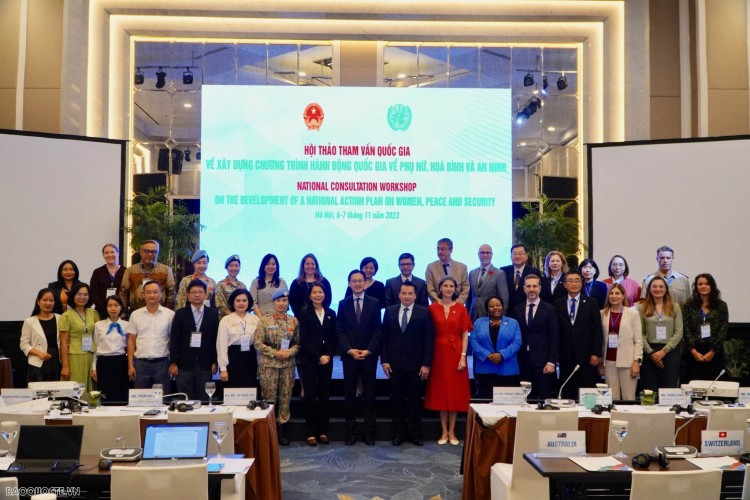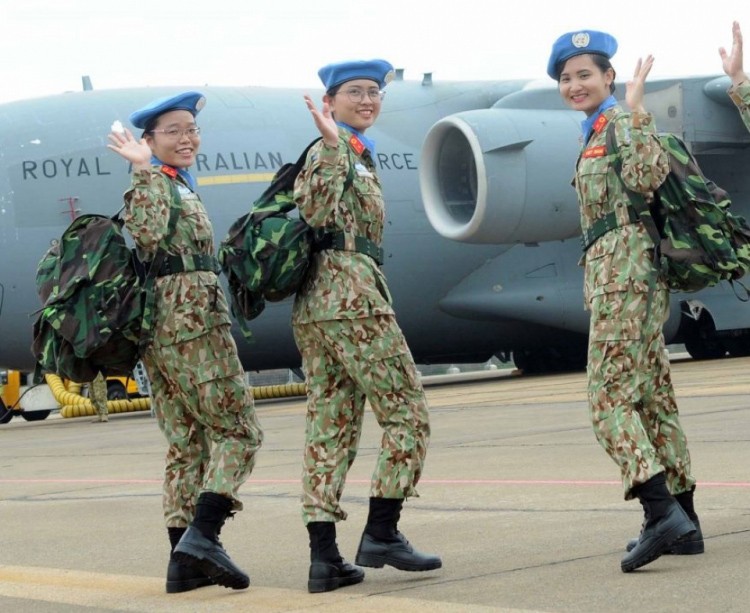
Shaping future of Vietnamese women, peace and security
Latest
 |
| Delegates take group photo at the National Consultative Conference on a draft National Action plan (NAP) on women, peace and security (WPS) in Hanoi on November 6. (Photo: Tuan Viet) |
Resolution 1325 - the core foundation
Speaking at the National Consultative Conference on a draft National Action plan (NAP) on women, peace and security (WPS) in Hanoi on November 6, Deputy Minister of Foreign Affairs Do Hung Viet cited Charles Fourier, the French thinker in the early 19th century as saying that “women’s liberation is the measure of liberating society”. Along with that ideology, President Ho Chi Minh affirmed “Talking about women is mentioning about half of society. Without liberating women, it is impossible to liberate half of human kind”.
Historical reality has shown that improving the role of women is closely associated with the development and progress of human society. Only when women are empowered and behaved equally, and their voices and experiences are valued and enhanced, solutions can be truly comprehensive, sustainable and long-lasting.
With that awareness and mindset, according to Deputy FM Do Hung Viet, the movement for women's rights and gender equality has made many important strides, including the achievements of the Women, Peace and Security Agenda.
Deputy FM Do Hung Viet underlined that the introduction of the UN Security Resolution 1325 in 2000 marked the birth of the WPS agenda with two major objectives of better ensuring the rights of women and girls, and promoting women's participation in all stages of conflict settlement and peace building process.
Two years after the passage of the Resolution 1325, United Nations Entity for Gender Equality and the Empowerment of Women (UN Women), then known as UNIFEM, conducted an independent assessment and gathered information on the role of women in peacebuilding in countries affected by conflicts.
This report mentioned the importance and urgency of transforming international framework on WPS into the real action in reality in each countries and regions. Therefore, since 2002, UNSC had some recommendations on Resolution 1325 through “national action program” (NAP).
In 2005, Denmark was the first country to build the national action program on Women, Peace and Security (NAPoWPS). Currently, there are 107 UN member countries (about 55%) passed NAPoWPS, in which 56 countries had the first NAPoWPS; 27 countries had the second generation of NAPoWPS, 15 countries with the third generation of NAPoWPS. There are 6 countries had 4 NAPoWPS and 2 countries had the 5th NAPs on this issue.
Journey to realize the goals
Throughout history, Vietnam had experience on WPS. Vietnamese women had mad great contribution in liberating and building country, creating Vietnamese tradition in general, and specific tradition for Vietnamese women of of “being heroic, indomitable, faithful, responsible”.
According to Deputy FM Do Hung Viet, these experiences motivated Vietnam to have important priorities for promoting the role of women in maintaining international peace and security right from Vietnam’s first participation in the UN Security Council in the 2008-2009 tenure.
Vietnam left an important imprint by pushing for the UN Security Council's adoption of Resolution 1889 (2009) on the role of women and girls in post-conflict context, which is considered one of the four fundamental resolutions of the council’s WPS agenda.
Vietnam has been one of the countries with a high rate of women participating in UN peacekeeping operations, reaching 16%, much higher than the UN average of 4%.
In 2020, in Hanoi, Vietnam successfully hosted International Conference commemorating the 20th anniversary of the implementation of Resolution 1325 of the UN Security Council, the only global event in the anniversary year, and at the same time adopted the Hanoi Commitment to Action was adopted with the co-sponsorship of 75 countries, calling for the building of NAPs on WPS.
 |
| Female soldiers from Level 2 Field Hospital No. 1 departed to join the UN peacekeeping force. (Photo: QT) |
However, Vietnam understood that the path to realize the goal of gender equality in general and the women, peace and security agenda in particular still faced many challenges. Even though the war has been over for a long time, Vietnamese people and especially women still face daily risks as well as severe consequences due to left over mines, explosives and toxic chemicals/dioxins, affecting the safety, daily security and livelihoods of millions of people, etc.
In that context, Deputy FM Do Hung Viet affirmed that Vietnam's building of the NAP on WPS has significant meanings in the current context, reaffirming the country’s strong commitments in the international community’s joint efforts to promote this agenda, creating resonance for the joint efforts of the international community to promote this Agenda.
NAPoWPS is aimed at narrowing the gender gap, creating conditions and opportunities for women to participate and enjoy equality in the fields of peace and security, contributing to maintaining peace, security and sustainable development nationally and internationally.
This National Action Program includes 4 main goals: (i) Enhancing the full and meaningful participation of Vietnamese women in the fields of foreign affairs, national defense, security, ensuring social safety, managing and responding to non-traditional national security challenges, as well as in peacekeeping and international security; (ii) Preventing and responding better to gender-based violence, especially in the context of incidents and disasters; (iii) Strengthening gender integration in relief and recovery activities, include troubleshooting the consequences of incidents and disasters, and the consequences of war and adapting to climate change; (iv) Promoting Vietnam's role and voice in promoting the WPS Agenda in multilateral forums, especially in ASEAN and the UN.
National Action Program after being built would supplement and complete policy frameworks on gender equality and women's empowerment. Particularly it would be the first comprehensive framework on this content in the field of peace and security, with specific goals and solutions to further promote actions for WPS, especially in the face of emerging challenges and non-traditional security challenges.
Vietnam always has “companions”
Ms. Caroline Nyamayemombe, Acting Chief Representative of UN Women in Vietnam, highly appreciated Vietnam's building of the National Council on Women, Peace, and Security.
She said that this is an action from the Vietnamese Government to realize the commitment in implementing the Hanoi Commitment to Action achieved at the 2020 Conference that recognizes the important role of Vietnamese women in creating peace and sustainable development.
According to her, during the past times, Vietnam has increased the participation of women, enhanced integration, demonstrated an important approach for women to join hands to resolve conflicts, and have a consistent commitment to towards the goal of sustainable development. "The United Nations will accompany Vietnam on this path", Ms. Caroline Nyamayemombe emphasized.
Tt the Conference, diplomatic representatives from many countries around the world shared high appreciation for Vietnam's building of the National Action Program on Women, Peace, and Security.
Sharing about the experience of Indonesia - a country that has implemented this National Action Program for 10 years, the representative of the Political Department of the Indonesian Embassy in Vietnam said that in addition to promoting international cooperation on WPS, Indonesia pays special attention to the participation of local and grassroots levels in this program, these are considered the most important nuclei to achieve the success of the Program at the national level, and eventually the regional level, and international one.
Being implementing 5th generation NAPoWPS, Norway also has experience in this area. Representative from Norway Embassy emphazied that creating a standard to evaluate program implementation is very important, creating a reference system that operates throughout from local to central level. Therefore, Vietnam also needs to pay attention to this factor in implementing its Action Program.
Thus, we can clearly see the role, meaning and importance of Vietnam's NAPoWPS in the current context. As the Acting Chief Representative of UN Women in Vietnam affirmed: “We must remember that we are not just shaping a document, but shaping the future of Vietnamese women and girls as well as peace and security of your own country".

















